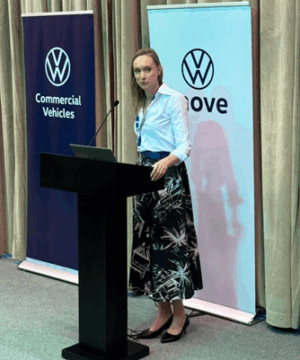By Ernest Bako WUBONTO, Kigali – Rwanda
The African Association of Automotive Manufacturers (AAAM) has called upon African leaders to hasten the implementation of standardized automotive policies aimed at boosting industry expansion and fostering regional collaboration.
Given that approximately 41 out of the 54 African nations lack robust fuel quality standards and essential automotive regulations, the association cautions that companies encounter obstacles when trying to increase their manufacturing capabilities and expand into various markets within Africa.
At a press conference discussing industrial advancements in Kigali, Rwanda, CEO of AAAM, Victoria Backhaus-Jerling, emphasized that failing to implement appropriate rules consistent with international benchmarks could result in Africa forfeiting substantial income crucial for its economic growth.
Aligning standards for vehicles, spare parts, and fuel quality is crucial,” she stated. “In order to develop regional supply chains and convert raw materials into advanced automotive goods, we require robust policies that facilitate this expansion.
She additionally stressed that unwavering political dedication, irrespective of shifts in governance, is essential for fostering sustained development within the automotive sector—highlighting instances where changes in administration have brought the progress on formulating auto policies to a standstill in certain nations.
Regarding the importance of this policy, Backhaus-Jerling stated: “Every country does not have to produce cars, but through well-defined guidelines, nations can utilize their advantages and work together to create effective and advantageous supply networks.”
Martina Biene, who serves as the Chairperson and Managing Director of Volkswagen Group Africa (VWGA) South Africa, echoed comparable views emphasizing that policy deficiencies impede certain market entrances.
She pointed out the subpar fuel quality in Nigeria, which arises due to inadequate regulations, as a significant hurdle for the company’s activities in that country previously. This was also why they postponed their return, even with multiple requests urging them to come back.
In numerous advanced economies, the automobile industry significantly contributes to their gross domestic product (GDP), placing it as the second-highest contributor to South Africa’s GDP after the mining sector. Nonetheless, because of inadequate policies, most African nations are failing to capitalize on these economic advantages.
Mrs. Biene similarly urged African governments to focus on the automotive sector and introduce policies to boost industrial growth, highlighting its significant earning capabilities.
The AAAM’s plea highlights the critical necessity for policy changes to unleash Africa’s automotive capabilities and promote economic unification across the continent.
Automobile Policy as Crucial Catalyst for Progress
Car insurance policies have the potential to significantly influence the development of the automotive sector across Africa.
Backhaus-Jerling emphasized that a transparent and supportive policy acts as an attraction for investments, particularly facilitating the inflow of foreign direct investment (FDI) into the automotive industry. This enables the setting up of manufacturing plants and development of supply networks.
She explained that these FIDs subsequently foster local production because policies aimed at promoting domestic manufacturing can assist in decreasing dependence on imported vehicles, generating employment opportunities, and boosting economic development.
The AAAM vigorously promotes regional integration supported by policies aimed at boosting regional trade and cooperation, thereby forming bigger markets that provide manufacturers with economically viable opportunities.
As the African Continental Free Trade Area (AfCFTA) aims to remove obstacles – aiding in the creation of larger economic scales and integrating African markets into international automotive supply chains – swiftly advancing the execution of auto policies will guarantee that Africa does not get left behind.
Provided by SyndiGate Media Inc.
Syndigate.info
).


Leave a Reply